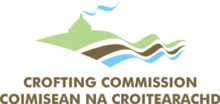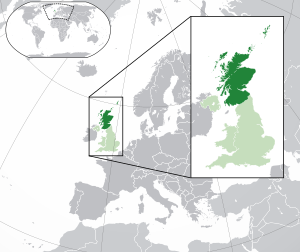Crofting Commission facts for kids
| Coimisean na Croitearachd (Scottish Gaelic) | |
 |
|
| Agency overview | |
|---|---|
| Formed | 2012 |
| Type | executive non-departmental public body |
| Jurisdiction | Crofting Counties |
| Headquarters | Crofting Commission, Great Glen House, Leachkin Road, Inverness, IV3 8NW |
| Agency executives |
|
| Parent agency | Scottish Government |
| Map | |

Scotland in the UK and Europe
|
|
The Crofting Commission (which is Coimisean na Croitearachd in Scottish Gaelic) is a special group in Scotland. It helps manage and protect a unique way of life called crofting. Crofting is when people live and work on small farms called "crofts." The Commission makes sure that crofting stays fair and useful for everyone.
This group started on April 1, 2012. It took over from an older group called the Crofters Commission. The Crofting Commission is based in Inverness, Scotland. It is a part of the Scottish Government.
The Commission has nine members. Six of these members are chosen by people in different crofting areas. The other three members are picked by the Scottish Government. A "Convener" leads the Commission. About 60 staff members help the Commission do its work.
Contents
What Does the Crofting Commission Do?
The main goal of the Crofting Commission is to be a helpful guide. It uses its powers to support the crofting system. Its job is to make sure crofting rules are fair. This helps protect crofting for people in the future.
Why are Crofts Important?
Crofts are very valuable pieces of land. The Commission wants crofters to understand their duties. This helps make sure crofts can be used well now. It also helps new crofters use them productively in the future.
What are Crofters' Duties?
All crofters, whether they rent their croft or own it, have important legal duties. These duties help keep the crofting system strong.
Every crofter must follow these three rules:
- They must live on their croft. Or they must live within 32 kilometers (about 20 miles) of it.
- They must farm their croft or use it for another good purpose.
- They must not misuse or neglect their croft.
What Happens if Duties are Not Followed?
Crofters usually manage their own crofts. This is called "self-regulation." It means crofters choose how to use their land. This helps their croft, their local community, and the whole crofting system.
However, if a crofter does not follow their duties, the Commission can check into it. If needed, they can take action. Other people in the crofting community can report problems. This includes local groups like Grazings Committees. They can tell the Commission if they think a crofter is not following the rules.
How the Crofting Commission Started
The idea of a commission for crofters is quite old. The first Crofters Commission was set up in 1886. This happened because of a law called the Crofters' Holdings (Scotland) Act.
A more modern Crofters Commission was created in 1955. This was under the Crofters (Scotland) Act 1955. The name of the Commission changed in 2012. It became the Crofting Commission. This change happened when the Crofting Reform (Scotland) Act 2010 came into effect.
 | James B. Knighten |
 | Azellia White |
 | Willa Brown |

